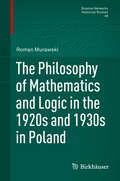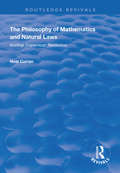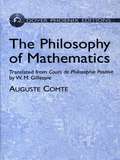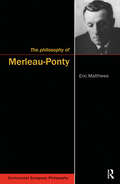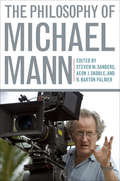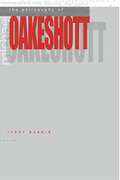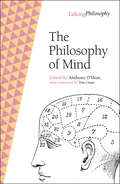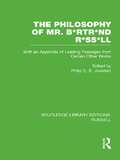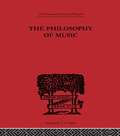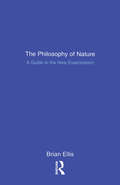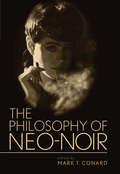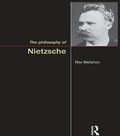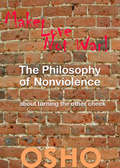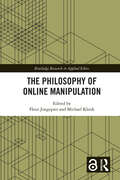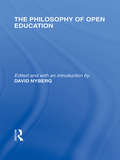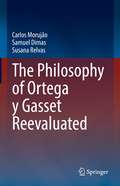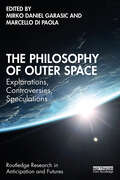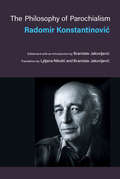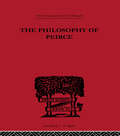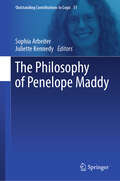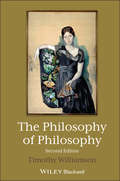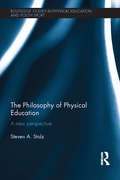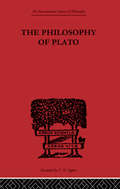- Table View
- List View
The Philosophy of Mathematics and Logic in the 1920s and 1930s in Poland
by Roman MurawskiThe aim of this book is to present and analyze philosophical conceptions concerning mathematics and logic as formulated by Polish logicians, mathematicians and philosophers in the 1920s and 1930s. It was a remarkable period in the history of Polish science, in particular in the history of Polish logic and mathematics. Therefore, it is justified to ask whether and to what extent the development of logic and mathematics was accompanied by a philosophical reflection. We try to answer those questions by analyzing both works of Polish logicians and mathematicians who have a philosophical temperament as well as their research practice. Works and philosophical views of the following Polish scientists will be analyzed: WacÅ,aw SierpiÅ,,ski, Zygmunt Janiszewski, Stefan Mazurkiewicz, Stefan Banach Hugo Steinhaus, Eustachy Å»yliÅ,,sk and Leon Chwistek, Jan Å ukasiewicz, Zygmunt Zawirski, StanisÅ,aw LeÅ>niewski, Tadeusz KotarbiÅ,,ski, Kazimierz Ajdukiewicz, Alfred Tarski, Andrzej Mostowski and Henryk Mehlberg, Jan SleszyÅ,,ski, StanisÅ,aw Zaremba and Witold Wilkosz. To indicate the background of scientists being active in the 1920s and 1930s we consider in Chapter 1 some predecessors, in particular: Jan Åsniadecki, Józef Maria Hoene-WroÅ,,ski, Samuel Dickstein and Edward Stamm.
The Philosophy of Mathematics and Natural Laws: Another Copernican Revolution (Routledge Revivals)
by Noel CurranFirst published in 1997, this title is a sequel to Dr Noel Curran's first book The Logical Universe: The Real Universe (published by Ashgate under the Avebury imprint, 1994). The philosophy of mathematics in this book is based on ideas of Sir William Rowan Hamilton on the ordinal character of numbers, the real numbers, the measure numbers, scalar numbers and the extension to vectors. The final extension is to Hamilton’s quaternions. This algebra is interpreted as the mathematics of spin. This led to a a new theory of time and space which is Euclidian. The motion of spin is absolute, no frame of reference is required. If time is assumed to have a beginning it would be asymmetric with an arrow. This concept is applied to the laws of nature, which are symmetrical. This is another Copernican Revolution in three aspects: absolute time is restored, time has an arrow - is asymmetric, and thirdly the theory is based on the motion of spin which is absolute and more fundamental than the motion of translation. This opens the way to the final unification of physics.
The Philosophy of Mathematics: Translated from Cours de Philosophie Positive by W. M. Gillespie
by Auguste ComteWritten by the nineteenth-century French philosophical founder of positivism, this comprehensive map of mathematical science assigns to each part of the complex whole its true position and value. The two-part treatment begins with a general view of mathematical analysis and advances to algebra, continuing with an exploration of geometry's ancient and modern methods.
The Philosophy of Merleau-Ponty (Continental European Philosophy Ser. #2)
by Eric MatthewsIn this introduction to the life and thought of one of the most important French thinkers of the twentieth-century Eric Matthews shows how Merleau-Ponty has contributed to current debates in philosophy, such as the nature of consciousness, the relation between biology and personality, the historical understanding of human thought and society, and many others. Surveying the whole range of Merleau-Ponty's thinking, the author examines his views about the nature of phenomenology and the primacy of perception; his account of human embodiment, being-in-the-world, and his understanding of human behaviour; his conception of the self and its relation to other selves; and, his views on society, politics, and the arts. A final chapter considers his later thought, published posthumously. The ideas of Merleau-Ponty are shown to be of immense importance to the development of French philosophy and the author evaluates his distinctive contributions and relates his thought to that of his predecessors, contemporaries and successors, both in France and elsewhere. This unrivalled introduction will be welcomed by philosophers and cognitive scientists as well as students taking courses in contemporary continental philosophy.
The Philosophy of Michael Mann (The Philosophy of Popular Culture)
by Aeon J. Skoble R. Barton Palmer Steven SandersA collection of essays exploring the philosophical themes and aesthetic vision behind blockbuster film including The Insider, Public Enemies,and more.Known for his finely crafted crime thrillers, American filmmaker Michael Mann has long been regarded as a talented triple threat capable of moving effortlessly between television and feature films as a writer, director, and executive producer. His unique visual sense and thematic approach are evident in the Emmy Award-winning The Jericho Mile, the cult favorite The Keep, the American epic The Last of the Mohicans, and the Academy Award-nominated The Insider, as well as more recent works such as Ali, Miami Vice, and Public Enemies.The Philosophy of Michael Mann provides a comprehensive account of the work of this highly accomplished filmmaker, exploring the director's recognizable visual style and the various on-screen and philosophical elements he has tested in his thirty-five-year career. The essays in this wide-ranging book will appeal to fans of the revolutionary filmmaker and to philosophical scholars interested in the themes and conflicts that drive his movies.
The Philosophy of Michael Oakeshott (G - Reference, Information and Interdisciplinary Subjects)
by Terry NardinThis is the first comprehensive study of Michael Oakeshott as a philosopher rather than a political theorist, which is how most commentators have regarded him. Indeed, the careful reading of his published and unpublished writings that Terry Nardin provides here shows that Oakeshott's concerns have been primarily philosophical, not political. These writings go far beyond politics to offer a critical philosophy of human activity and of the disciplines that interpret and explain it. Oakeshott argues that inquiry can be independent of practical concerns, even when its subject is the thought and action of human beings.Although the book considers Oakeshott's views on morality, law, and government, it is primarily concerned with his ideas about the character of knowledge, especially knowledge of intelligent human conduct, and focuses attention on the concepts of modality, contingency, and civility that are central to Oakeshott's philosophy as a whole. Nardin seeks to show how Oakeshott's critique of scientism and other forms of foundationalism supports a powerful version of the argument that history is the proper mode for understanding human choice and action.The book thus provides the fullest discussion available of Oakeshott's antifoundationalist view of epistemology, metaphysics, and the philosophy of history and the human sciences. It examines his arguments concerning the criteria of truth, the forms of knowledge, the relationship between theory and practice, the place of interpretation in the social sciences, the nature and importance of historical explanation, and the definition of philosophy itself. And it is the first study to look at Oakeshott's relationship to phenomenology, hermeneutics, and other movements in twentieth-century Continental philosophy.
The Philosophy of Mind (Talking Philosophy)
by Tim Crane Anthony O’HearA deep concern with consciousness and intentionality is one of the several things that has lately moved into the centre of the philosophy of mind. The issue of consciousness is often treated as something distinct from intentionality, but – as Tim Crane notes in his incisive new Foreword – there is now something of a sea-change. This classic volume may be at least partly responsible for the shift in how philosophy of mind is starting to be understood. Before its first appearance, discussions of consciousness and intentionality in the context of perception were in their infancy. The book was a departure from the way this part of philosophy was conceived. It pointed to new ways to look at the discipline, addressing both the epistemology of mind, and intentionality and consciousness, especially in connection with perception. Showcasing many leading figures in the field, it offers a splendid overview of the issues at stake.
The Philosophy of Movement: An Introduction
by Thomas NailAn influential thinker distills years of work on the philosophy of movement into one accessible account Why are city dwellers worldwide walking on average ten percent faster than they were a decade ago? Why are newcomer immigrant groups so often maligned when migration has always constituted civilization? To analyze and understand the depth of the reasons, Thomas Nail suggests that it serves us well to turn to a philosophy of movement. Synthesizing and extending many years of his influential work, The Philosophy of Movement is a comprehensive argument for how motion is the primary force in human and natural history. Nail critiques the bias toward stasis at the core of Western thought, asking: what would a philosophy that began with the primacy of movement look like? Interrogating the consequences of movement throughout history and in daily life in the twenty-first century, he draws connections and traces patterns between scales of reality, periods of history, and fields of knowledge. In our age of rapid movements shaped by accelerating climate change and ensuing mass global migration, as well as ubiquitous digital media, Nail provides a contemporary philosophy that helps us understand how we got here and how to grapple with these interlocking challenges. With a foreword by philosopher Daniel W. Smith, The Philosophy of Movement: An Introduction is a must-read for scholars and students not only of philosophy but also history, anthropology, science and technology studies, mobility studies, and other fields across the humanities and social sciences.
The Philosophy of Mr. B*rtr*nd R*ss*ll: With an Appendix of Leading Passages from Certain Other Works. A Skit. (Routledge Library Editions: Russell)
by Philip E. B. JourdainThis skit of Bertrand Russell’s philosophy was originally published in 1918 by Russell’s correspondent friend Jourdain. The introduction explains that the contents purport to be lost papers written by Mr. B*rtr*nd R*ss*ll, a contemporary of Bertrand Russell. This politically humorous volume from the early 20th Century parodies the writing style of Russell as well as his theories.
The Philosophy of Music: Being The Substance Of A Course Of Lectures (classic Reprint) (International Library of Philosophy)
by William PoleFirst published in 2000. Routledge is an imprint of Taylor & Francis, an informa company.
The Philosophy of Nature: A Guide to the New Essentialism
by Brian EllisIn "The Philosophy of Nature," Brian Ellis provides a clear and forthright general summation of, and introduction to, the new essentialist position. Although the theory that the laws of nature are immanent in things, rather than imposed on them from without, is an ancient one, much recent work has been done to revive interest in essentialism and "The Philosophy of Nature" is a distinctive contribution to this lively current debate. Brian Ellis exposes the philosophical and scientific credentials of the prevailing Humean metaphysic as less than compelling and makes the case for new essentialism as an alternative metaphysical perspective in lucid and unambiguous terms. This book develops this alternative metaphysic and considers the consequences for philosophy, and for some other areas of investigation, of working with such a metaphysic. Ellis argues that these consequences are profound and that a new essentialism provides a comprehensive new philosophy of nature for a modern scientific understanding of the world.
The Philosophy of Neo-Noir (The Philosophy of Popular Culture #Ppcs)
by Mark T. ConardA collection of essays exploring the philosophical elements present in Neo-Noir films.Film noir is a classic genre characterized by visual elements such as tilted camera angles, skewed scene compositions, and an interplay between darkness and light. Common motifs include crime and punishment, the upheaval of traditional moral values, and a pessimistic stance on the meaning of life and on the place of humankind in the universe. Spanning the 1940s and 1950s, the classic film noir era saw the release of many of Hollywood’s best-loved studies of shady characters and shadowy underworlds, including Double Indemnity, The Big Sleep, Touch of Evil, and The Maltese Falcon. Neo-noir is a somewhat loosely defined genre of films produced after the classic noir era that display the visual or thematic hallmarks of the noir sensibility.The essays collected in The Philosophy of Neo-Noir explore the philosophical implications of neo-noir touchstones such as Blade Runner, Chinatown, Reservoir Dogs, Memento, and the films of the Coen brothers. Through the lens of philosophy, Mark T. Conard and the contributors examine previously obscure layers of meaning in these challenging films. The contributors also consider these neo-noir films as a means of addressing philosophical questions about guilt, redemption, the essence of human nature, and problems of knowledge, memory and identity. In the neo-noir universe, the lines between right and wrong and good and evil are blurred, and the detective and the criminal frequently mirror each other's most debilitating personality traits. The neo-noir detective?more antihero than hero?is frequently a morally compromised and spiritually shaken individual whose pursuit of a criminal masks the search for lost or unattainable aspects of the self. Conard argues that the films discussed in The Philosophy of Neo-Noir convey ambiguity, disillusionment, and disorientation more effectively than even the most iconic films of the classic noir era. Able to self-consciously draw upon noir conventions and simultaneously subvert them, neo-noir directors push beyond the earlier genre's limitations and open new paths of cinematic and philosophical exploration.Praise for The Philosophy of Neo-Noir“Conard can feel confident that these terrific essays will be of interest to film enthusiasts, particularly fans of Neo-Noir. Additionally, for those who come to this volume with some background in philosophy, not only will they be pleased to find fellow philosophers offering accessible introductions to philosophical thinkers and ideas but they are sure to increase their understanding of noir, Neo-Noir, and many familiar film titles, as well as more deeply appreciate the ways in which popular film and television offer wide and varied avenues to doing good philosophy.” —Kimberly A. Blessing, co-editor of Movies and the Meaning of Life“Taking up such latter-day classics as Chinatown, Blade Runner, and Memento, this volume explores how contemporary filmmakers have taken up the challenge of classic film noir and broadened the genre. In this analysis, even the pastel shades of South Beach take on a dark coloring in Miami Vice. These probing essays locate what is neo in Neo-Noir and thus define it as a postmodern genre.” —Paul Cantor, author of Gilligan Unbound: Pop Culture in the Age of Globalization“This collection will serve as a terrific interdisciplinary guide through the chaotic, intriguing world of postmodernist thought as it relates to film and philosophy.” —Choice
The Philosophy of Nietzsche: A Guide (Oxford Guides To Philosophy Ser. #4)
by Rex WelsonThis important new introduction to Nietzsche's philosophical work provides readers with an excellent framework for understanding the central concerns of his philosophical and cultural writings. It shows how Nietzsche's ideas have had a profound influence on European philosophy and why, in recent years, Nietzsche scholarship has become the battleground for debates between the analytic and continental traditions over philosophical method. The book is divided into three parts. In the first part, the author discusses morality, religion and nihilism to show why Nietzsche rejects certain components of the Western philosophical and religious traditions as well as the implications of this rejection. In the second part, the author explores Nietzsche's ambivalent and sophisticated reflections on some of philosophy's biggest questions. These include his criticisms of metaphysics, his analysis of truth and knowledge, and his reflections on the self and consciousness. In the final section, Welshon discusses some of the ways in which Nietzsche transcends, or is thought to transcend, the Western philosophical tradition, with chapters on the will to power, politics, and the flourishing life.
The Philosophy of Nonviolence
by Osho Osho International FoundationWhile nonviolence is a philosophy to Mahatma Gandhi; it is not a philosophy to Osho, but an experience. Osho talks about his understanding of reverence for life, he does not use the word non-violence.
The Philosophy of Online Manipulation (Routledge Research in Applied Ethics)
by Michael Klenk Fleur JongepierAre we being manipulated online? If so, is being manipulated by online technologies and algorithmic systems notably different from human forms of manipulation? And what is under threat exactly when people are manipulated online? This volume provides philosophical and conceptual depth to debates in digital ethics about online manipulation. The contributions explore the ramifications of our increasingly consequential interactions with online technologies such as online recommender systems, social media, user friendly design, microtargeting, default settings, gamification, and real time profiling. The authors in this volume address four broad and interconnected themes: What is the conceptual nature of online manipulation? And how, methodologically, should the concept be defined? Does online manipulation threaten autonomy, freedom, and meaning in life and if so, how? What are the epistemic, affective, and political harms and risks associated with online manipulation? What are legal and regulatory perspectives on online manipulation? This volume brings these various considerations together to offer philosophically robust answers to critical questions concerning our online interactions with one another and with autonomous systems. The Philosophy of Online Manipulation will be of interest to researchers and advanced students working in moral philosophy, digital ethics, philosophy of technology, and the ethics of manipulation.
The Philosophy of Open Education (International Library of the Philosophy of Education Volume 15)
by David Nyberg'Open', 'informal', and 'humanistic' are words used to describe new styles of education which depart from ordinary or traditional education. Too often, however, these adjectives are used in a strongly polemical or self-justifying rather than analytical way. Often too, the grounds for accepting or rejecting open education are political or moral, instead of being based on a consideration of the nature of open education and its strength and weaknesses. This collection of essays is central to the debate on open education, analyzing the important concepts in the field. The contributions, all written by authorities on the philosophy of education, deal with problems of definition, knowledge, socialization, freedom, cultural perspective, and unique meanings and metaphors.
The Philosophy of Ortega y Gasset Reevaluated
by Carlos Morujão Samuel Dimas Susana RelvasThe present text surveys and reevaluates the meaning and scope of Ortega y Gasset’s philosophy. The chapters reveal the most important aspects of his history such as the Neokantian training he went thru in Germany as well as his discovery of Husserl’s phenomenology around 1912. The work also covers his original contributions to philosophy namely vital and historical reason - and the cultural and educational mission he proposed to achieve. The Spanish – and to a certain extent the European – circumstance was the milieu from which his work emerged but this does not limit Ortega’s scope. Rather, he believed that universal truths can only emerge from the particulars in which they are embedded. The publication in 2010 of a critical edition of his Complete Works opened worldwide access for many unpublished manuscripts, and some of his lectures. There is renewed interest among students and researchers in Ortega and this book uniquely delivers scholarship on his content in English.
The Philosophy of Outer Space: Explorations, Controversies, Speculations (Routledge Research in Anticipation and Futures)
by Mirko Daniel Garasic Marcello Di PaolaThis volume provides a rigorous philosophical investigation of the rationales, challenges, and promises of the coming Space Age.Over the past decade, space exploration has made significant and accelerating progress, and its potential has attracted growing attention from science, states, businesses, innovators, as well as the media and society more generally. Yet philosophical theorizing concerning the premises, values, meanings, and impacts of space exploration is still in its infancy, and this potentially immense field of study is far from mainstream yet. This book advances outer space philosophy by integrating key scientific and societal debates sparked by recent developments in space research and activities with conceptual, existential, ethical, aesthetic, and political themes and concerns. It maps various regions of philosophical exploration, reflection, and speculation regarding humanity’s present and future emanations into outer space, to promote a broad, rich, and nuanced societal debate regarding this transformative enterprise, which is as stimulating as it can be disorienting.This book will be a fascinating read for academics, researchers, and students interested in philosophy, space studies, science and technology studies, future studies, and sustainability.
The Philosophy of Parochialism
by Radomir KonstantinovicThe Philosophy of Parochialism is Radomir Konstantinovic’s (1928–2011) most celebrated and reviled book. First published in Belgrade as Filosofija palanke in 1969, it attracted keen attention and controversy through its unsparing critique of Serbian and any other nationalism in Yugoslavia and beyond. The book was prophetic, seeming to anticipate not only the bloody disintegration of Yugoslavia in the 1990s, but also the totalitarian turn in politics across the globe in the first decades of the new century. With this translation, English-speaking audiences can at last discover one of the most original writers of eastern European late modernism, and gain an important and original perspective into contemporary politics and culture in the West and beyond. This is a book that seems to age in reverse, as its meanings become deeper and more universal with the passage of time. Konstantinovic’sbookresists easy classification, mixing classical, Montaigne-like essay, prose poetry, novel, and literary history. The word “philosophy” in the book’s title refers to the solitary activity of reflection and critical thinking, and is also paradoxical: according to the author, a defining characteristic of parochialism is precisely its intolerance toward this kind of self-reflexivity. In Konstantinovic’s analysis, parochialism is not a simply a characteristic of a geographical region or a cultural, political, and historical formation—these are all just manifestations of the parochial spirit as the spirit of insularity. His book illuminates the current moment, in which insularity undergirds not only ethnic and national divisions, but also dictates the very structure of everyday life, and where individuals can easily find themselves locked in an echo chamber of social media. The Philosophy of Parochialism can help us understand better not only the dead ends of ethnic nationalism and other atavistic ideologies, but also of those cultural forces such as digital technologies that have been built on the promise of overcoming those ideologies.
The Philosophy of Peirce: Selected Writings (International Library of Philosophy)
by Justus BuchlerFirst published in 2000. Routledge is an imprint of Taylor & Francis, an informa company.
The Philosophy of Penelope Maddy (Outstanding Contributions to Logic #31)
by Juliette Kennedy Sophia ArbeiterThis volume features more than 20 essays that explore the work of one of the most important contemporary philosophers of mathematics. It will help readers to better appreciate this significant and prolific philosopher. Within philosophy of mathematics, Penelope Maddy initially advocated realism. She then went on to advance naturalism. Both of her positions became very influential in the field, along with her other work in the philosophy of logic. The contributors comment on and otherwise engage with Maddy’s work. They also weigh in on the state of set theory and its philosophy, the philosophy and history of logic, naturalism, skepticism, and the myriad other areas to which Maddy left her mark. Overall, coverage traces her influence on these various ideas over the years. It will also help readers to better understand how philosophers working at the forefront of these areas see these concepts today. These essays will be essential reading for the wide group of philosophers working in these different areas as well as graduate students studying philosophy of mathematics and logic and the other related issues to which Maddy has contributed. The volume will also appeal to logicians and set theorists in general, as well as to philosophers working in analytic philosophy more widely, as well as to those working in the history of philosophy.
The Philosophy of Philosophy (The Blackwell / Brown Lectures in Philosophy)
by Timothy WilliamsonThe expanded new edition of one of the most influential and controversial books about the nature of philosophy published in the past several decades The Philosophy of Philosophy presents an original, unified concept of philosophy as a non-natural science. In this provocative work, distinguished philosopher Timothy Williamson challenges widely-held assumptions and clarifies long-standing misconceptions about the methodology and nature of philosophical inquiry. The author rejects the standard narratives of contemporary philosophy developed from naturalism, the linguistic turn, postmodern irony, and other prominent trends of the twentieth century. Viewing the method of philosophy as evolving from non-philosophical pursuits, Williamson provides readers with fresh insight into the “self-image” of philosophy and offers new ways of understanding what philosophy is and how it actually works. Now in its second edition, this landmark volume comprises the original book and the author’s subsequent work. New topics include the recent history of analytic philosophy, assessments of experimental philosophy, theories of concepts and understanding, Wittgensteinian approaches, popular philosophy, naturalism, morally-loaded examples in philosophy, philosophical applications of scientific methods, and many more. This edition features the author’s latest thoughts on a variety of issues, autobiographical reflections, and replies to critics. Proposes an alternative narrative about the nature of philosophy Argues that the common assumption of philosophical exceptionalism is false Highlights the similarities between philosophy and the other sciences in both methodology and subject matter Explores why contemporary philosophy has failed to articulate an adequate methodology Emphasizes increasing the methodological standards of reasoning in philosophy The Philosophy of Philosophy, Second Edition remains essential reading for philosophers, scholars, graduate and advanced undergraduate students in philosophy, and other readers with a sustained interest in the method and rationale of the doing of philosophy.
The Philosophy of Physical Education: A New Perspective (Routledge Studies in Physical Education and Youth Sport)
by Steven A. StolzThe discipline area of physical education has historically struggled for legitimacy, sometimes being seen as a non-serious pursuit in educational terms compared to other subjects within the school curriculum. This book represents the first attempt in nearly thirty years to offer a coherent philosophical defence and conceptualisation of physical education and sport as subjects of educational value, and to provide a philosophically sound justification for their inclusion in the curriculum. The book argues that rather than relegating the body to “un-thinking” learning, a person’s essential being is not confined to their rationality but involves an embodied dimension. It traces the changing conceptions of the body, in philosophy and theology, that have influenced our understanding of physical education and sport, and investigates the important role that embodiment and movement play in learning about, through and in physical education. Physical education is defended as a vital and necessary part of education because the whole person goes to school, not just the mind, but the thinking, feeling and acting facets of a person. It is argued that physical education has the potential to provide a multitude of experiences and opportunities for students to become aware of their embodiment, explore alternative modes of awareness and to develop insights into and new modes of being not available elsewhere in the curriculum, and to influence moral character through the support of a moral community that is committed to that practice. Representing a sophisticated and spirited defence of the educational significance and philosophical value of physical education and sport, this book will be fascinating reading for any advanced student or researcher with an interest in physical education, the philosophy of sport or the philosophy of education.
The Philosophy of Plato (International Library of Philosophy)
by Rupert C. LodgeFirst Published in 2000. Routledge is an imprint of Taylor & Francis, an informa company.
